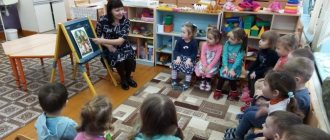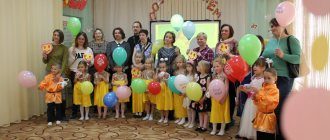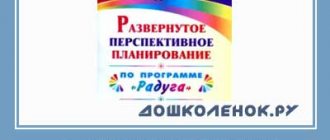MAGAZINE Preschooler.RF
Organization of work on moral and patriotic education in the preschool educational systemMukhametzhanova Olga Vladimirovna MBDOU "Krepysh" teacher Noyabrsk, Yamal-Nenets Autonomous Okrug
The problem of educating a patriotic citizen is as old as the world. It stood before humanity when the first state arose and has not lost its significance to this day. The state program “Patriotic Education of Citizens of the Russian Federation” gives the following definition of patriotic education: this is the systematic and purposeful activity of government bodies and organizations to develop in citizens a high patriotic consciousness, a sense of loyalty to their fatherland, readiness to fulfill civic duty and constitutional duties to protect the interests of the Motherland .
Currently, the urgent problem of introducing the younger generation to the culture and history of their people is discussed at various levels and is reflected in a number of normative documents:
Federal Law “On Education in the Russian Federation” dated December 29, 2012 N 273-FZ;
Thus, according to the National Doctrine of Education in the Russian Federation, approved. By Decree of the Government of the Russian Federation dated 04.10.2000 No. 751, the education system is designed to provide:
- historical continuity of generations, preservation, dissemination and development of national culture, fostering a careful attitude towards the historical and cultural heritage of the peoples of Russia;
- education of patriots of Russia, citizens of a legal, democratic state, capable of socialization in a civil society, respecting the rights and freedoms of the individual, possessing high morality and showing national and religious tolerance, respect for the languages, traditions and culture of other peoples.
Among the objectives of the National Strategy of Action for Children for 2012-2017, approved. by Decree of the President of the Russian Federation dated June 1, 2012 No. 761, there is also this: the formation of a new public-state system for raising children, ensuring their socialization, a high level of citizenship, patriotism, tolerance, and law-abiding behavior.
“Strategy for the development of education in the Russian Federation until 2025” , approved. Decree of the Government of the Russian Federation dated May 29, 2015 N 996-r identifies, among others, the following priorities of state policy in the field of education:
- formation in children of a high level of spiritual and moral development, a sense of involvement in the historical and cultural community of the Russian people and the fate of Russia
- formation of respect for the Russian language as the state language of the Russian Federation, which is the basis of the civil identity of Russians and the main factor of national self-determination
In modern conditions, awakening children's interest in the historical and cultural heritage of Russia, civic and patriotic education are among the tasks of preschool education. Thus, according to the Federal State Educational Standard for Preschool Education (FSES DO, approved by Order of the Ministry of Education and Science of Russia dated October 17, 2013 No. 1155, one of the educational areas “Cognitive Development” , in particular, involves the formation in children of primary ideas about their small homeland and Fatherland , sociocultural values of our people, about domestic traditions and holidays.
Thus, the moral and patriotic education of children is one of the main tasks of a preschool educational institution. Meanwhile, patriotism is a complex and high human feeling. Its content is so multifaceted that it is indefinable in a few words. This is love for family and friends and for the small homeland, and pride for one’s people. Patriotic feelings are formed in the process of life and existence of a person located within a specific sociocultural environment. From birth, people instinctively, naturally and imperceptibly get used to their environment, the nature and culture of their country, the way of life of their people. Naturally developing feelings of attachment to paternal values become the subject of comprehension in the process of targeted patriotic education, on their basis beliefs and willingness to act accordingly are formed.
The goal of patriotic education in preschool educational institutions is to educate a humane spiritual and moral personality, worthy future citizens of Russia, patriots of their Fatherland.
The objectives of the moral and patriotic education of preschool children are:
- nurturing a child’s love and affection for his family, home, kindergarten, street, city
- developing a caring attitude towards nature and all living things
- instilling respect for work
- development of interest in Russian traditions and crafts
- formation of basic knowledge about human rights
- expanding ideas about Russian cities
- introducing children to the symbols of the state (coat of arms, flag, anthem)
- developing a sense of responsibility and pride for the country's achievements
- the formation of tolerance, a sense of respect for representatives of other nationalities, peers, parents, neighbors, and other people.
- formation of self-esteem as a representative of one’s people.
These tasks are solved in all types of children's activities: in classes, in games, in work, in everyday life, as they instill in the child not only patriotic feelings, but also form his relationships with adults and peers.
It can be said without exaggeration that civic and patriotic education is one of the most difficult areas in preschool education for a number of reasons, including:
- features of preschool age
- multidimensionality of the concept of “patriotism” in the modern world
- lack of concept, theoretical and methodological developments (a characteristic feature of many studies is to address only certain aspects of the problem).
To date, none of the preschool education programs makes it possible to fully solve the problems of moral and patriotic education of preschoolers. Teachers have to independently collect and systematize the material. It becomes obvious that there is a need to create new models for organizing work on the moral and patriotic education of children, and to search for innovative approaches and technologies.
Pedagogical conditions:
- heuristic environment in kindergarten and in the family;
- close cooperation between kindergarten teachers and family members;
- preparedness of teachers and parents to solve problems of instilling patriotism in children.
Let us dwell on the means of implementing the tasks of NIP in preschool educational institutions; these include:
- Creation of favorable material, technical, educational and methodological conditions
- Close contact on this issue with the family, relying on its traditions and experience.
- Consistent orientation towards cultural conformity of education, designed to ensure the formation of a person’s spiritual world;
- Updating the content of education, selecting the most interesting and accessible material based on the experience and feelings of children;
The system of work on civic and patriotic education in preschool educational institutions is built consistently, starting from a young age with gradual complication in accordance with the experience of children, taking into account the principle of developmental education.
The first feelings of patriotism. Are they accessible to children? Based on experience in this area, we can give an affirmative answer. Research in the field of preschool pedagogy and psychology indicates that it is in preschool age that the basic foundations of personality are laid, the process of formation and formation of sociocultural experience begins, and is “formed . And here one cannot help but recall the words of L.N. Tolstoy, who argued that “Love for the Motherland is not an abstract concept, but a real spiritual force that requires organization, development and culture”
Contents of patriotic education in kindergarten.
In order for a preschool institution to help foster patriotic feelings, the life of the children there must be rich, interesting, so that it is remembered for a long time, and becomes a system of joyful childhood memories.
It is very important that the child loves his kindergarten. This happens when educators treat each child with respect, know their best traits and promote their development through games, holidays, interesting activities, etc.
For this purpose, the teacher organizes excursions around the kindergarten and introduces preschoolers to the staff.
Children should also know on which street their kindergarten is located, how and why it is called that, and that it is located next to the kindergarten. Knowledge enriches children's senses and gives them confidence and meaning.
Feelings and relationships become stronger if children invest their work in the kindergarten (participate in landscaping the area, decorating the premises for the holidays).
The yard, the street on which the child lives can also help strengthen friendship and a sense of ownership (my yard, my street). Here, it is of paramount importance for parents to form such feelings in their children.
At the same time, this also raises the question of the need to provide children with information about their street: its name, what is located on it, what kind of transport there is, how this street is connected to the territory where the kindergarten is located (can you walk or have to drive).
It would be good if parents or teachers take photographs of their children on the street, or make a video of a walk, and then watch a film in a group and talk about this street.
The next stage is to cultivate love and friendship for your hometown. This part of the work requires relying more on the cognitive sphere, on the child’s imagination and memory.
For a child, the city is concretized by the street, the fact that he is aware, first of all, of himself as a resident of his street. In order for children to “feel” their city, they need to be told about it and shown it. Children travel around the city with their parents. Sometimes an excursion also needs to be organized for the kindergarten.
Children of senior preschool age can and should know the name of their city, its main streets, attractions, museums, theaters, etc. We will reveal more about work in this direction below. Developing an attitude towards one's country is based on a cognitive component: children are given information that they should and can learn. The peculiarity is that knowledge should be emotional and encourage the child to be active.
We reinforce the name of the country with children in games ( “Who can name the most countries” , “Which country are the guests from” , “Whose fairy tale is this” , “Which country is this toy from” ), in exercises like “From different names of countries, identify our country” , “Let's look for our country on a map, globe” , “How to write an address on an envelope” and others.
Children should know the name of the capital of our Motherland and its attractions.
Examination of illustrations, slides, videos, works of art, stories from adults, photographs, excursions, drawing, travel games - all this helps to solve the problem. Children are introduced to the symbols of the country, they are told that each country has its own flag, coat of arms, and anthem. They tell where and when they can see them.
When getting acquainted with the nature of the native country, the emphasis is on beauty, wealth, and its characteristics. Children should get an idea of what animals live in our forests and what trees grow.
The main goal of these activities is to awaken in children's hearts a love for their native country with its rich and diverse nature. To implement it, it is necessary to use observation, excursions, simple experiments, work on sites, conversations based on paintings, reading and dramatization of works of fiction, walks along the “ecological trail” , relaxation “in a cheerful meadow” with interesting games. Preschoolers are happy to get involved in environmental activities.
The means of patriotic education is art: music, works of art, fine arts, folk arts and crafts. It is necessary that works of art used in working with children be highly artistic.
An important area of work to foster love for the Motherland is the formation in children of ideas about the people of their native country. First of all, it is necessary to remember those people who glorified our country - artists, composers, writers, inventors, scientists, philosophers, doctors (the choice depends on the teacher). It is necessary, using specific examples, through specific people, to introduce children to the “character” of the Russian people (creativity, skill, melodiousness, hospitality, goodwill, responsiveness, the ability to defend their homeland). The teacher tries to introduce preschoolers to people who have certain qualities or skills, and to involve children in their activities.
People say: a good example is better than a hundred words. To implement this wise pedagogical technique in life, it is necessary to organize meetings for preschoolers with interesting people and representatives of various professions. During such meetings, children see that the ordinary people around them write good poetry, bake delicious bread, operate complex mechanisms, compete for awards in sports competitions, etc.
Of great importance for educating a conscientious citizen is instilling a respectful attitude towards war heroes, veterans, in memory of those who died defending the fatherland; respect for soldiers - defenders of the Motherland. Children with sincere gratitude go together with their parents and teachers to the obelisk of Glory and lay flowers. Conversations, meetings with veterans, excursions, the use of songs, poems, and visual material have a great influence. It’s good when, after each event, children pick up pencils and paints and reproduce their impressions in visual arts.
It is advisable to invite children to ask and talk about the interesting work of their parents, and then hold a competition for the best story. To strengthen the memory of the family, it is of great importance to instill (in both adults and children) respect for the burials of ancestors.
Relations developing between subjects of the educational system
An important condition for successful pedagogical activity in instilling citizenship and patriotism in preschool children is interaction with the students’ parents. Touching “living” documents of family history awakens the child’s thoughts, evokes emotions, makes them empathize, and be attentive to the memory of the past, their historical roots, and the preservation of family ties.
According to A. S. Makarenko, it is in the family and under the guidance of parents that a future citizen grows. Everything that happens in the country must come to children through the soul and thought of teachers. Our preschool teachers adhere to these recommendations when working with preschoolers and interacting with their parents.
Currently, such work is relevant and especially difficult, requiring great tact and patience, since in modern families the issues of education of citizenship and patriotism are not considered important and often only cause bewilderment.
The basis for interaction with parents in our preschool educational institution is a structural and functional model, which consists of three blocks:
I – information and analytical block. Review and analysis of information about parents and children, study of families, their person-oriented communication based on a common cause. It includes:
a) study of literature (psychological-pedagogical, popular science, legal);
b) studying the level of readiness of teachers to interact with families and children;
c) studying the level of readiness of parents, their attitude to this problem;
d) study of the subject-developmental environment of groups, preschool institutions.
c) determination of work methods, work planning, deadlines;
c) preparation of necessary materials
d) making changes to the work programs of educators.
II – practical block. Solving specific problems related to the patriotic education of children.
III – control – evaluation. Analysis of the effectiveness of events: repeated surveys, participation of parents in kindergarten events, patriotic competitions. a) analysis of questionnaires;
b) collecting feedback;
c) analysis of the work of teachers;
d) presentation of projects.
Let us dwell in more detail on the second, practical block, which involves active forms of interaction with parents and children
Forms of cooperation with parents:
- “Educational” cooperation (consultations, meetings, excursions, library “Educating a Citizen Together” ).
- Cooperation in the framework of leisure activities, project activities, weekend excursions, work activities;
The following active forms of interaction with children and parents can be implemented in preschool educational institutions:
- Targeted walks to Memory Square combined with a tour of the mini-museum of the kindergarten.
- Excursion to Memory Square. The content of such excursions is: observations of ritual moments: laying flowers at the monument, a minute of silence, meeting with participants in the war;
- Reading fiction appropriate to the age category of children - about defenders of their native land, the Fatherland, for example, reading works from the series “Grandfather’s Medals” .
- Use of ICT technologies: showing video materials about the native land, about the heroism of the Russian people, about the Great Patriotic War, about famous battles and battles ( "Kursk Bulge" , "Battle of Stalingrad" ).
- Examination of illustrations, paintings, various reproductions containing necessary historical facts and events from the surrounding life.
- Meetings with veterans, participation in holidays: “City Day” , “Mother’s Day” , “Daddy’s Day” , “Victory Day” , etc.
- Preparation of thematic exhibitions dedicated to memorable dates, making souvenirs for war veterans, involving the active participation of parents in their preparation and organization: creating collages, gifts, albums, etc.
- Conducting competitions for family projects: “My Motherland is the place where I was born” , “Coat of Arms of my family” , “Heroes of my family” , “My pedigree” , etc.
- “Weekend routes” with the involvement of parents, who are offered a route with a detailed description of the site being visited and recommendations for easily acquainting the child with the monument.
- Drawing up recommendations for parents on visiting the children's library with their children, with a list of recommendations. works of moral and patriotic themes, questions on content.
- Organizing an exhibition of children's works on military-patriotic themes.
- Involving the parent community in providing all possible assistance in creating a mini-museum of a preschool educational institution
- General parent meeting dedicated to the influence of family and social factors on the formation of moral and patriotic feelings of preschoolers.
In solving the search for effective methods of interaction between subjects of the educational process in a preschool educational institution, it is advisable to use the project method. This method will allow combining the interests of all subjects, organizing the process of raising and educating children step by step and consistently: from identifying their experience to joint planning and implementation of what is planned. Thus, the parent has the opportunity to actively participate in the process of patriotic education of his child and the group as a whole, and the child’s activities are organized in accordance with his interests, desires and needs.
Organization of teacher activities
- Traditional: seminars, workshops, creative groups, exchange of experience, pedagogical advice, training, business game, etc.
- Innovative: project activities, master classes, creation of a bank of innovative ideas, participation in creative competitions, publishing activities.
Speaking about the education of citizenship and patriotism in preschool educational institutions, we must first of all take care that the little person becomes a man with a capital “H”, so that he can distinguish bad from good, and his aspirations and desires are aimed at creation, self-determination and development in himself those qualities and values thanks to which we can firmly say about him that he is a patriot and a citizen of his Motherland: hardworking, merciful, active, independent, emotionally responsive, loving loved ones, his Motherland, his people, honoring its traditions and culture
Bibliography
- National doctrine of education in the Russian Federation, approved. Decree of the Government of the Russian Federation dated 04.10.2000 No. 751.
- Vetokhina A.Ya. Moral and partisan education of preschool children /A. Y. Vetokhina - St. Petersburg: Detstvo-Press, 2015. - 192 p.
- Dronova T.N. Together with the family: a guide on the interaction of a preschool educational institution and parents / T. N. Doronova, G. V. Glushkova, T. I. Grizik, etc. - M.: Prosveshchenie, 2005. - 190 p.
| Next > |
Patriotic education in preschool educational institutions
The content of the Federal State Educational Standard for Educational Education notes the urgent need to intensify the process of instilling patriotism in preschoolers. Children at this age are very inquisitive, responsive, and receptive. They easily respond to all initiatives and are able to sincerely sympathize and empathize. For the educator, this is a time of fertile soil. Indeed, at this age great opportunities arise for the systematic and consistent moral education of children. The formation of the child’s spiritual foundation, emotions, feelings, thinking, processes of social adaptation in society takes place, and the process of realizing oneself in the world around us begins. It is this period of a person’s life that is most favorable for the emotional and psychological impact on a child, since his images are very bright and strong, and therefore they remain in memory for a long time, and sometimes for a lifetime, which is very important in the education of patriotism.
Pedagogical principles are known: love for the Motherland begins with an attitude towards the closest people - father, mother, grandfather, grandmother, with love for one’s home, the street on which the child lives, kindergarten, school, city.
Preschool educational institutions, being the initial link of the education system, are called upon to form in children a first understanding of the world around them, an attitude towards their native nature, their small Motherland, their Fatherland.
Patriotism is a manifestation of love not only for a strong and beautiful, great and powerful country, but also for a country that is going through hard times: poverty, misunderstanding, discord, or military conflicts. It is in our time that cultivating a sense of patriotism, citizenship, and responsibility for the fate of one’s country is one of the most important tasks of education.
K. D. Ushinsky wrote: “A child has nothing to deny, he needs positive food, only a person who does not understand the needs of childhood can feed him with hatred, despair and contempt.”
Understanding the importance of this issue, one of the priority areas of the preschool educational institution is work on moral and patriotic education, the task is included in the annual plan: to familiarize students with the cultural values of their people, the basic national values of Russian society, and the formation of Russian citizenship in them.
Therefore, our task, as teachers, is to: cultivate in a child love and affection for his family, home, kindergarten, street, city; formation of a caring attitude towards nature and all living things;
instilling respect for work; developing interest in Russian traditions and crafts; formation of basic knowledge about human rights; expanding ideas about the city; introducing children to the symbols of the state (coat of arms, flag, anthem);
feelings of responsibility and pride for the country's achievements; the formation of tolerance , a sense of respect for other peoples and their traditions.
Step-by-step work in this area of patriotic education is being implemented in the following areas:
1. Methodological support. 2. Working with children 3. Working with parents
All areas are interconnected and include:
- Getting to know your hometown and its history
- Getting to know your native land and Russia
- Acquaintance with the most significant historical events of your country and people.
- Acquaintance with epic heroes and their exploits.
- Acquaintance with the state symbols of the city and region.
To solve this significant problem, the preschool educational institution has drawn up a long-term plan for the year. It included consultations:
‒ “The system of patriotic education in preschool educational institutions, review of programs and technologies”;
‒ “How to introduce preschoolers to the historical past of Russia. Contents of work, methods and techniques";
‒ “For preschoolers about defenders of the fatherland.”
As a result, these consultations increased the level of pedagogical literacy of educators.
Mutual attendance at cognitive cycle classes, including issues of patriotic education of preschoolers, helped young teachers adopt practical methodological techniques for presenting complex material to preschoolers. All preschool teachers demonstrated a series of open classes at a high professional level. Classes such as “Our ancestors are the Slavs”, “Heroes of the Russian Land”, “For preschoolers about the Great Patriotic War” were held with interesting presentations. Summing up the results of the competition for patriotic education corners showed that the teachers of our preschool educational institution understand the significance of the issue and create conditions for children to absorb these feelings from childhood. During the competition for the best game in patriotic education, teachers showed creativity. As a result, the card files of games for groups were replenished, and teachers exchanged experiences on creating interesting games.
As part of the month of mass defense and military-patriotic work, the following conversations were held at MDOBU kindergarten No. 1 in the city of Labinsk:
A conversation dedicated to the liberation of the Labinsky region and Kuban from the Nazi invaders with the aim of educating patriotic feelings among preschoolers using the example of heroic destinies during the war, events during the occupation of their native land - Kuban by German invaders;
Conversation “Defenders of the Russian Land;
“A step towards a great victory; Conversation “Battlefields of Russia; Conversation dedicated to the victory of Soviet troops at Stalingrad; Conversation dedicated to the 73rd anniversary of the landing of Soviet troops on Malaya Zemlya in the city of Novorossiysk.” Presentations were used in the discussions. The teachers, together with the parents, collected interesting material about the exploits of their fellow countrymen, Russian soldiers. The groups organized exhibitions of pioneer heroes, and read stories about their exploits. The preschool educational institution organized an exhibition of children's works on the theme “Worthy of the Memory of Heroes.” The authors of the best works were awarded prizes. During the game “Zarnitsa”, the children received positive emotions, they passed obstacles with pleasure and clearly reported on the completion of the task to the commander-in-chief. At the end of the game, our students received medals with dignity from the commander-in-chief (a military member of a military unit. The teachers played the game in military uniform. All this brought the situation closer to real events, the children got used to the role and strived to win). The children were especially touched by the meeting with the WWII veteran P.A. Sharin. At the end of the month, the children watched the cartoon “Malchish-Kibalchish” and remembered the songs of the war years in a musical and literary composition.
By organizing work on patriotic education in modern conditions, we introduce not only history, but also do not forget about current events. The 2014 Sochi Olympics will go down in history - children should feel proud of our athletes, of our country and also of their republic. The moral formation of personality occurs primarily in the process of activity, as a result of which collective relationships arise between people. In work and study, a person’s physical and spiritual strength is developed, a sense of duty and responsibility for the assigned work, for the successes of the team and one’s own is formed, the will is strengthened, and character is formed. The game simulates complex life situations that require a certain line of behavior among athletes, mutual understanding, camaraderie, and mutual assistance.
An equally important condition for the patriotic education of children in our preschool educational institution is a close relationship with parents and family. Currently, this work is relevant and especially difficult, requiring great tact and patience, since in young families the issues of instilling patriotism and citizenship are not considered important and often only cause bewilderment.
So that work with parents is not limited to the framework of pedagogical education (conversations, consultations), we have set a goal - to involve them in the process of patriotic education through interaction: involving parents and children in a common cause (participation in performances, games, projects, competitions).
As a result, the wonderful project of the Bondarev family “I am proud of my grandfather” was born. After presenting a presentation at a parent meeting at a preschool educational institution, many parents became imbued with this problem and show great interest in our activities with children, offering their services in organizing and conducting them. Parents take an active part in creative competitions: drawing and craft competitions, for the best group decoration for the New Year, the best Christmas tree toy, etc.





